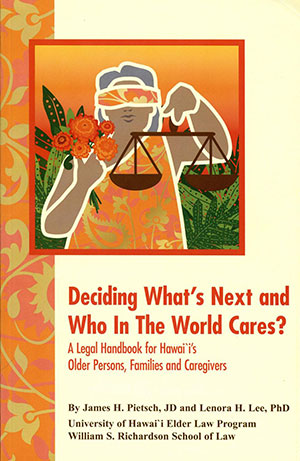
The Elder Law Program at the University of Hawaiʻi at Mānoa William S. Richardson School of Law has updated its indispensable guide to aging, including offering clear coverage of the many legal and medical issues involved.
The handbook, titled Deciding What’s Next and Who in the World Cares? A Legal Handbook for Hawaiʻi’s Older Persons, Families and Caregivers, is available free on Oʻahu through the senior helpline at the City and County of Honolulu’s Elderly Affairs Division.
James H. Pietsch, Elder Law Program director, law school professor and co-author, said that the updated handbook is especially valuable for new caregivers uncertain about where to turn for help. The book also has an extensive resource glossary, including current phone numbers and email addresses.
“Folks planning ahead need to have sufficient information about incapacity, disability and, in general, growing old in America, so we wanted to provide some basic legal information and guidance,” said Pietsch.
This new edition of the award-winning handbook was prepared by Pietsch and Hawaiʻi Elder Law Program Administrator Lenora H. Lee. Funded in part by the U.S. Administration on Aging, it was printed through a grant from the City and County of Honolulu Elderly Affairs Division.
“Many people don’t have a good sense about end-of-life issues, wills, powers of attorney, trusts, healthcare coverage, elder abuse issues and even hiring a care-giver,” said Pietsch. “Very often, it’s thrust upon them very quickly and they need help in a hurry. We know a lot of people will look to it for crisis intervention.”
The handbook offers easy-to-read guidance through many areas of potential legal tangles for caregivers and for families in coping with an aged loved one. It includes updates on laws and data current to the fall of 2014. This is the fourth in the most recent series that includes “Deciding What If?,” “Deciding Who Cares?” and “Deciding What’s Next?”
The handbook provides a broad overview of what families may be facing, but is not intended to be a substitute for personal legal advice, said Pietsch. He hopes families will turn to it before a crisis in order to plan ahead.
“We hope this will give them a roadmap to at least know how to get started,”u said Pietsch.
To obtain a copy, please call:
- Oʻahu: (808) 768-7700
- Big Island: (808) 961-8600
- Maui: (808) 270-7774
- Lānaʻi: (808) 565-6818
- Kauaʻi: (808) 241-4470
For more information, read the UH Mānoa news release.
—By Beverly Creamer

